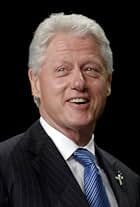Bill Clinton
☼ Born on 19 December 1946, in Hope, Arkansas, USA
Biography
His father, a sales representative, died in a car accident a few months before his birth. His mother then moved to New Orleans. Bill Clinton initially grew up with his grandparents. In 1950 his mother returned to Hope. That same year she married car dealer Roger Clinton. As a member of a student delegation from the patriotic American Legion, Clinton met in Washington D.C. with President John F. Kennedy. Clinton was interested in politics from a young age. After graduating from high school, he studied international relations at Georgetown University in Washington D.C. until 1968. He then studied law at Yale and Oxford Universities on a scholarship until 1973. During his studies, Clinton was already involved in various student organizations. He played saxophone in a jazz band and supported himself as a staffer in the office of Senator J. William Fulbright. In 1968, Clinton received a "Rhodes Scholarship" that allowed him to travel to the University of Oxford, England.
From 1970 he studied law at Yale University. After receiving his doctorate in 1973, he briefly worked for the House Judiciary Committee. From 1973 to 1976 he was appointed to the University of Arkansas School of Law. In 1974 he ran for a seat in the House of Representatives, but was narrowly defeated by the Republican incumbent John-Paul Hammerschmidt. In 1975, Bill Clinton married Hillary Rodham, Hillary Clinton. In 1976, Clinton was elected to the office of Attorney General of Arkansas. Two years later, in 1978,
(click to expand)
at just 32 years old, he was appointed governor of Arkansas, the youngest head of government of an American state at the time. After two years he resigned from the senatorial office. His daughter Chelsea was born in 1980. From 1980 to 1983, Bill Clinton worked at the law firm of Wright, Lindsey and Jennings in Little Rock. At the end of 1983 he was re-elected as governor of Arkansas. In 1985 he became a co-founder of the "Democratic Leadership Council" and from 1990 its chairman.
From 1986 to 1987, Clinton served as chairman of the National Governors Association. In 1991, Clinton decided to run for president. In July 1991 he was nominated as the Democratic presidential candidate. Senator Al Gore, who was running for vice-presidency, went into the election campaign with him. Throughout the entire election campaign, Bill Clinton was in the lead by a clear margin, not least because of his successful connection to the historical myth of former President John F Kennedy. In the presidential election on November 3, 1992, Clinton won over the incumbent George H. W. Bush. He then moved into the White House on January 20, 1993 as the 42nd President of the United States of America. At 46, he was the third youngest president in the history of the United States, after Theodore Roosevelt and John F. Kennedy. Clinton's top priorities during his term in office were the introduction of health insurance, reconciliation with Vietnam, and combating drug abuse, gun violence, and poverty in the United States and the world.
On foreign policy matters, Clinton visited Germany on July 10, 1994. In Berlin he gave a speech in which Clinton, like John F. Kennedy in 1963, said in German "America is at your side - now and forever." In 1994 he received an honorary doctorate from Oxford University. In terms of foreign policy, he supported the Israeli-Jordanian peace process, which led to the peace treaty between the two countries. At the CSCE summit in Budapest in 1995, Clinton, Boris Yeltsin and the presidents of Ukraine, Belarus and Kazakhstan exchanged views on the instruments of ratification of the START I Agreement. The Treaty on the Reduction of Nuclear Weapons with a Range of More Than 5,500 km, signed in 1991, thus came into force. In the following presidential election in November 1996, Clinton was able to clearly assert himself in office against Bob Dole. The summit meeting between Boris Yeltsin and Clinton in Helsinki ended in March 1997 without an agreement on the dispute over NATO's eastern expansion. In May 1997, Clinton traveled to Mexico on an official visit. It was the first visit by a US president to the neighboring country since 1979.
In May 1997, the "Basic Act on Mutual Relations, Cooperation and Security between the North Atlantic Organization and the Russian Federation" was signed in Paris. After a long budget dispute between the administration and Congress, an agreement on tax cuts was reached. The US budget was brought out of the red for the first time since 1969. President Clinton's second term was overshadowed by allegations of sexually assaulting government employee Paula Jones in a hotel room in 1991. Clinton denied the accusation.
For the first time in the history of the United States, a sitting president testified under oath on his own behalf on January 17, 1998. On January 26, 1998, Clinton reaffirmed his sworn statement that he had not had an extramarital affair with his intern, Monica Lewinsky. Clinton also rejected the accusation that he had incited Lewinsky to make false statements with an affidavit. For the first time in 130 years, i.e. H. Since the presidency of Andrew Johnson, impeachment proceedings have again been opened against an American president in office.
Clinton later revised his statement. However, at the end of the investigation in 1999, the allegations were not sufficient for either impeachment or indictment. In March 1998, Clinton became the first US president to undertake an extensive tour of southern Africa. As part of this trip, he announced debt relief for African reform states. Paula Jones' lawsuit against Clinton was dismissed by the Arkansas federal court in April 1998. After bombings at the US embassies in Kenya and Tanzania, the US fired cruise missiles at six suspected terrorist camps in Afghanistan in retaliation on August 20, 1998. In October 1998, Israeli Prime Minister Benjamin Netanyahu and Palestinian President Yasser Arafat signed a peace agreement in Washington at Clinton's initiative. This got the peace process in the Middle East, which had been stalled for almost two years, back on track. Despite protests from the Chinese government, Clinton received the Dalai Lama at the White House in November 1998. As a result of the 2000 hacker attacks on the World Wide Web, a conference on Internet security issues began in Washington. Clinton advocated for a national security center.
On June 2, 2000, during his visit to Germany, Bill Clinton became the first US president to receive the International Charlemagne Prize from the city of Aachen. In his laudatory speech, Gerhard Schröder praised Clinton's commitment to growing together in Europe. That same month, he became the first U.S. president to deliver a speech to the Russian parliament. He offered Russia comprehensive cooperation. During his three-day visit to Moscow, he met with Russian President Vladimir Putin and privately visited former President Boris Yeltsin. At the turn of the millennium, Bill Clinton completed his term as one of the most successful presidents of the United States. Above all, his commitment to new companies and technologies gave the USA the longest economic rise in its history. His successor as US President was George W. Bush, who was sworn in as the 43rd President of the United States on February 20, 2001. On June 22, 2004, Bill Clinton published his biography entitled "My Life" in New York. The almost 1,000-page work was pre-ordered two million times before publication.
Bill Clinton underwent quadruple heart bypass surgery in New York on September 6, 2004, but he survived without incident. The former US President is committed to fighting poverty, corruption and climate change worldwide with his "Clinton Global Initiative", which held its first conference in New York in mid-September 2005. For his tireless efforts to help the poorest, Bill Clinton was awarded the German media prize "Bambi" by Hubert Burda Medien in the "Charity" category in Germany in December 2005. In 2007 he was honored with the TED Prize and in 2013 Clinton was awarded the Presidential Medal of Freedom, the United States of America's highest civilian honor, by Barack Obama.
In the role of actor
We Feed People – Hot Docs 2022 (11/05/2022)
Ron Howard directs a look into José Andrés‘ World Central Kitchen organization in We Feed People. First becoming known as a celebrity chef, Spanish chef José Andrés put his culinary skills to humanitarian use by founding his organization World Central Kitchen. The organization’s goal is to provide disaster relief by making meals for at least […]
Our New President (06/05/2018)
The story of Trump’s election is told entirely through Russian propaganda in Our New President. Compiled from material from Russia’s stations Russia-1, Russia TV, and NTV, the media empire of Russia works overtime to sabotage Hilary Clinton, while celebrating Donald Trump. This results in a film about news, which is completely devoid of any true […]
Command and Control (26/09/2016)
Human error nearly results in the accidental detonation of a nuclear warhead in Command and Control. On September 18, 1980, a maintenance crew working on the Titan-II missile, at Little Rock Air Force Base’s Launch Complex 374-7 in Damascus, Arkansas, accidentally drops a socket, which ends up piercing the missile’s fuel tank. Fuel begins leaking […]
Fed Up (02/05/2014)
Over the past 30 years, obesity has essentially become an epidemic, with two out of every three Americans being overweight. Narrated by journalist Katie Couric, Fed Up examines why the obesity rate is going up, despite the efforts of people to eat right and regularly exercise. The answer possibly lies within the food industry itself, […]
The Disappeared (23/03/2013)
The Disappeared tells the story of six shipwreck survivors stranded on two life boats in the middle of the Atlantic ocean. The crew consists of Captain Gerald (Brian Downey), Mannie (Billy Campbell), Gib (Ryan Doucette), Pete (Shawn Doyle), Merv (Gary Levert), and Dickie (Neil Matheson). Gerald estimates that they are 600 miles from shore and […]


